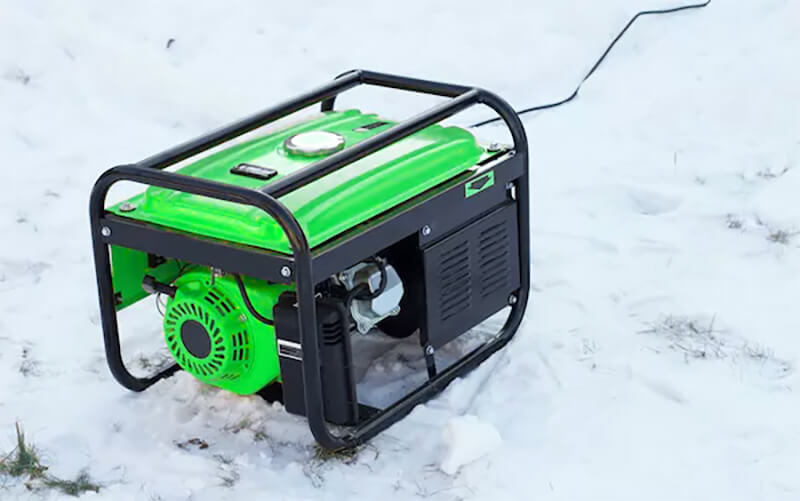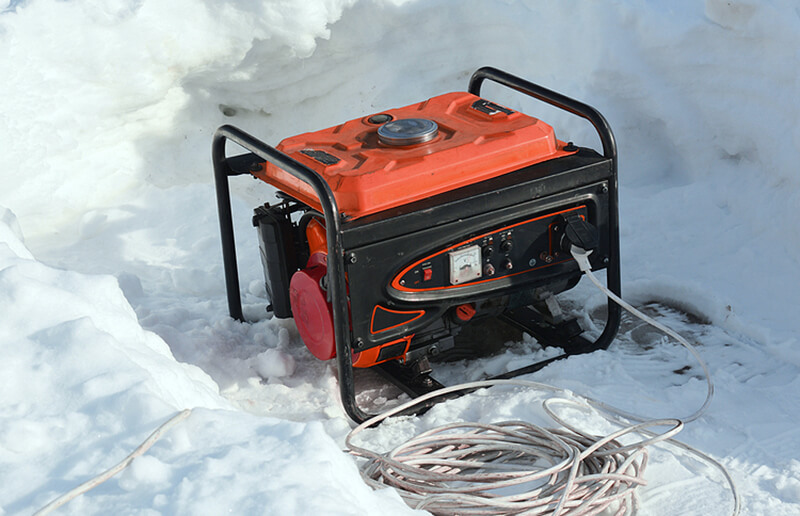15May 2024
table of contents

When the chilly winter season arrives, numerous objects in our houses need some extra handling and focus, and your generator fits this category. The extreme cold, accumulation of snow, and icy conditions can seriously compromise the functionality of your generator. Thus, the correct winterization procedures are crucial to maintain its uninterrupted functioning.
You may ask, why is it so important to winterize your generator? It’s not just the cold weather we face in the winter. Severe storms and power outages are possible. Your power has just been cut off and you go to start your generator, but it fails. Generally, the predominant reason for this malfunction is the lack of adequate anti-freeze safeguards for generator.
In this blog, BISON will walk you through the entire process of preparing your generator for winter in a detailed, step-by-step manner. From meticulous cleaning and appropriate storage to regular check-ups, we will provide you with insightful advice that will ensure your generator operates without hiccups throughout the winter season.
The first problem with not winterizing a generator is that it prevents the generator from starting in cold weather. Lower temperatures can thicken the oil inside the generator, making it difficult to circulate properly and preventing successful starting.
Neglecting anti-freeze protection can cause ice and snow to accumulate around the generator and its various components, leading to blockages. Frost can seep into mufflers and air purifiers, or freeze fuel lines. When you depend on a generator during a power failure, it subsequently impacts the generator's capacity for effective power production.
Additionally, a generator that has not been winterized may allow moisture to accumulate, which can lead to internal corrosion. Generators are exposed to winter weather time and time again, which without proper maintenance can lead to rust and eventual failure of various components. This degradation can significantly shorten the life of the generator and cause unnecessary financial burden and significant repair or replacement costs.
In summary, you must prepare your generator for severe winter weather if you do not want unexpected system failure or a significant reduction in generator life.

Clean the exterior: Start by cleaning the generator thoroughly. Utilize a moist cloth to clear away grime, dust, and other particles from the exterior. A build-up of these elements could lead to overheating and compromise the optimal functionality of the generator.
Choose the right storage location: When storing your generator during the winter, choose a dry, clean location. Avoid placing it in humid places to avoid rust. Additionally, this area should make it easy for you to perform periodic timer-based startup and maintenance checks.
Drain the fuel: When you maintain your generator's fuel lines, the life of your generator will be extended. Unused fuel left in a generator during the winter can develop gum, varnish, or rust that can clog fuel lines. Therefore, when running out of fuel, make sure the tank and lines are completely drained.
Clean the carburetor: Generator's carburetor is another prone area for gum and varnish accumulation from stale fuel, thus obstructing its seamless functioning. By cleaning carburetor, you can get rid of this issue and enhance your generator's performance.
Change engine oil and filter: Engine oil tends to thicken in freezing temperatures, causing problems when starting. Replace existing oil with winter-grade oil to maintain fluidity in cold weather. Also, consider changing your oil filter to keep your generator running smoothly.
Remove the spark plugs: Removing and inspecting the spark plugs can give you clues about potential generator problems, such as burning oil or an overly rich fuel mixture. Should the plug be deteriorated, it should be substituted.
Battery maintenance: For brief storage durations under 30 days, it's advisable to detach the battery to avoid it from depleting. For extended storage over 30 days, the use of battery charger is suggested to ensure the battery stays charged throughout winter months.
Acquire a generator cover: It's worth investing in a robust cover for your generator, particularly if it's stored outside. This will help in wardaring off dust, moisture, and small critters.
Start it regularly: Even if it's stored, it's a good idea to start your generator every 30 days and let it run for a few minutes. This keeps engine components lubricated and helps prevent carbon buildup.
Remember, winterizing may seem like a task, but it is essentially insurance to keep your portable generator running efficiently. It will save you a lot of trouble and ensure you never lose power when you need it most on those cold winter nights.
Backup generators are often the unsung heroes during power outages and require some TLC to survive the winter and continue to perform their duties effectively. Follow these steps to make sure they're winter ready.
Keep the generator area pristine: Start by cleaning the area around the generator. Remove all debris, leaves, and snow to prevent any accidental fires or to avoid compromising the generator's ventilation. A clean, well-ventilated space ensures better performance.
Get into the habit of daily adjustments and cleaning: Generators run best when they are well maintained. Routine inspections may include checking fuel and oil levels, checking for leaks and obvious wear and tear. Clean your generator regularly and resolve any problems promptly.
Fit a battery heater: The freezing conditions can affect your battery's performance and create obstacles in your generator's start-up process. A solution is to fit a battery heater, which can help retain the warmth of your battery and guarantee its uninterrupted function even in frosty weather, thereby reducing the chance of unforeseen operational issues.
Start up regularly: Just because your generator is "backup" doesn't mean it should be forgotten until an emergency occurs. Start your generator weekly to ensure it is ready when needed. Often usage helps to keep engine parts well-oiled, lessens probability of carbon accumulation, and assists in sustaining battery's charge.
Fuel stabilizer: If your generator runs on oil, employ fuel stabilizer to stop fuel from spoiling or creating a gummy residue that might obstruct carburetor.
By winterizing your backup generator, you can avoid costly repairs and replacements. What's more, you'll be confident that your power will not be interrupted during any winter weather event, ensuring your heating, lighting and other essentials stay running when you need them most.

For those who rely on generators year-round, especially in areas with harsh climate conditions, the task of frost protection becomes even more important. These steps can help you ensure your generator runs smoothly year-round:
Check exhaust and vents: Regular inspection of your generator’s exhaust and ventilation system is critical. Any blockage here can cause harmful gases to build up, leading to potential health hazards or mechanical complications. Particularly during the winter, examine for any build-up of ice or snow that may obstruct vents or exhaust pipes, and address such issues promptly.
Fit an engine block heater: One reliable method to ensure your generator withstands chilly winter season is by installing an engine block heater. It keeps the generator warm, ready for immediate start-up, and reduces mechanical strain during icy weather.
Use winter-grade oil: For year-round generators, switch to winter-grade oil during the colder months. This oil is designed to stay liquid even in freezing temperatures, allowing your generator to start and run more smoothly.
Maintain adequate fuel supply: Always make sure there is enough fuel to keep your generator running during the long winter outages. Store spare fuel safely and pay attention to storage times and conditions. Propane has a long shelf life and is an excellent choice for situations like this.
Antifreeze measures for commercial diesel generators are crucial.
Get a thorough inspection: Before winter arrives, check your diesel generator for any leaks, broken or worn parts. Don't ignore even minor damage, as it can escalate into larger problems in cold temperatures. Should you encounter any problems, rectify them at once.
Clean or replace oil filter: Gradually, accumulated particles can clutter the filter and impede the generator's efficiency. The transition between seasons serves as a great cue to overhaul or substitute your oil filter to guarantee the engine receives an unobstructed stream of pristine oil.
Change your engine oil regularly: Frigid temperatures can lead to the thickening of your engine oil, resulting in a challenging start-up for your generator. Frequent oil replacements can help avert this occurrence. Also, consider changing to a lower viscosity oil during the winter to help fuel flow better when it's cold.
Maintain the diesel fuel system: The fuel system of a diesel generator requires special maintenance. Diesel can condense in freezing temperatures, preventing it from reaching the engine. Use anti-freeze diesel fuel or add anti-gelling additives to prevent this problem.
Run a "winter readiness" test before storage: After maintenance is complete, run the generator to make sure it starts up and runs properly without any problems. This test ensures that all maintenance has been performed correctly and that the machine is ready for winter.
Consult an expert: It's essential not to underestimate the value of professional advice. Continuous upkeep conducted by a certified specialist aids in preserving the effectiveness and lifespan of your generator. They can address minor glitches before they evolve into substantial issues, helping you avoid possible winter incidents.
Use a block heater: A block heater warms the engine, simplifying the initiation and operation of it in cold weather conditions. It is an excellent add-on for commercial generators that suffer from harsh winters.
Check the battery: Battery problems are one of the main reasons why a generator fails to start. Regularly inspect, clean and maintain battery systems. A battery heater can be a worthwhile investment during the colder months.
Following these winterization steps for your commercial diesel generator will ensure uninterrupted operation. Keep in mind that preventative measures may take time initially, but the cost is much less than the cost of downtime or extensive repairs. The safety, productivity, and efficiency of your business depend on it.
Whether it is for residential use, year-round applications or commercial settings, frost-proofing your generator is critical to ensuring its optimal performance during the colder months. No matter what type of generator you have, it's crucial to take precautions before winter arrives. Basic steps include regular inspections and cleaning, adjusting fuel and oil systems, checking exhaust and vents, using winter-grade motor oil, and installing a heater to keep engine components warm. Ignoring these steps can result in annoying outages, expensive repairs, or outright failure when the temperatures drop.
Now that you’re familiar with winterizing your generator, why not consider upgrading to one that can withstand freezing conditions? BISON generators feature rugged designs and high-quality components, so they always provide reliable power, even in freezing weather.
inquiry form here
BISON BLOG, All the latest news and views from Bison Machinery.